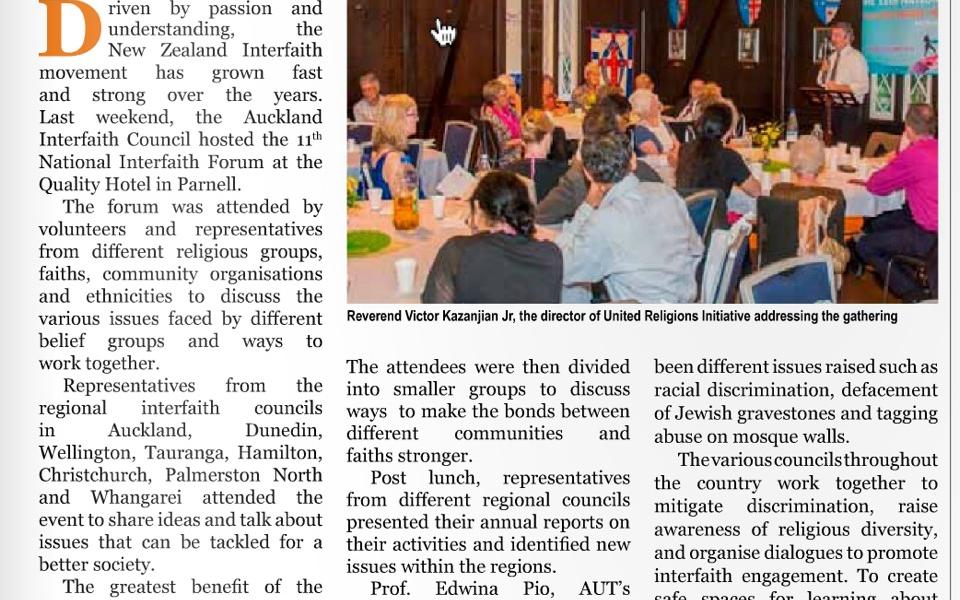
Read the article in the Indian Weekender.
Read Victor's Keynote Address at the 11th National Forum, New Zealand here.
I have just returned from participating in the 11th National Interfaith Forum in Auckland, New Zealand, and am so inspired by this event that brought interfaith councils from all over the country on the theme “Building Bridges – Hearts, Communities, Humanity.” Not only was there a powerful sense of community among people of a diverse array of religious, spiritual, Indigenous and humanistic backgrounds, but there was a strong commitment to moving beyond “friendly” conversations among like-thinking people, to a space that welcomes differences of opinions, disagreements and the tensions essential to true interfaith dialogue. There was also a clear commitment to moving beyond dialogue to action—including both community-based actions to address local concerns and coalition-based actions that influence public policy.

The foundation of URI’s work in New Zealand has been long anchored by George Armstrong, a URI founding leader, who, together with his wife Jocelyn, has taught, trained and mentored generations of people committed to interfaith work in New Zealand and around the world. George and Jocelyn continue to be at the forefront of interfaith work including Jocelyn’s most recent work launching the Center for Religious Diversity in New Zealand, which will give a home for research on the interfaith movement.

One of the most striking parts of my experiences in New Zealand was learning at a deeper level about the centuries-old tension between the Indigenous peoples of New Zealand, collectively referred to as the Maori people, and the Anglo “settlers” (Pakeha) who established colonial settlements displacing the Indigenous peoples of New Zealand from their land and rights. Many Maori and Pakeha peoples have worked to acknowledge this history and rebuild a nation by weaving together the intersecting stories of these two peoples, and also by including the many other groups (including Christians, Muslims, Jews, Buddhists, Hindus, Bahai’s and Sikhs) that have followed, which has created the diversity of present-day New Zealand.

As cultural and religious diversity increases across the country, the work of intercultural and interfaith understanding and dialogue is crucial for New Zealand. The over 120 people who attended the conference, mostly belonging to interfaith councils in the various regions of New Zealand, are working hard to build bridges of understanding, dispelling stereotypes and prejudice and promoting diversity as a core value for the country. Joining me at the National Forum was URI’s East Zone SEAPAC Regional Coordinator, Nivy Balachandran, whose work in Australia, New Zealand and the Pacific Islands is galvanizing this growing interfaith energy and interest.

I expect that many more interfaith groups in New Zealand will formally join URI in the years to come. Thanks to URI leaders such as Peter Mousaferiadis, George and Jocelyn Armstrong, Nivy Balachandran, and their many colleagues in the interfaith movement, New Zealand and Australia are places of extraordinary interfaith dialogue and action.




